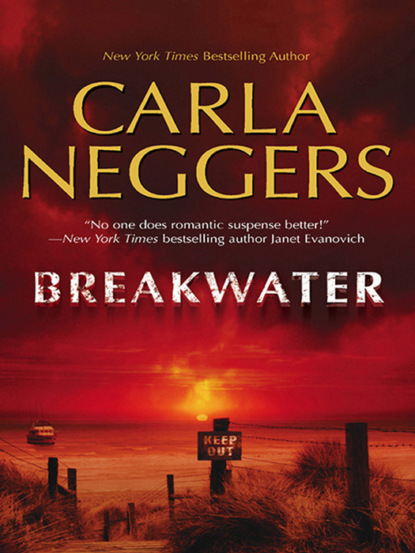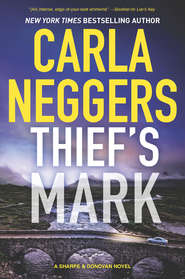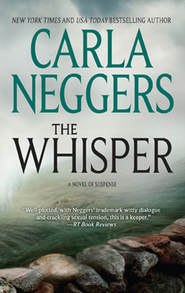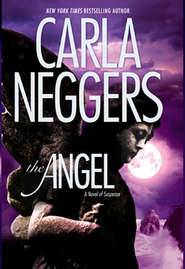По всем вопросам обращайтесь на: info@litportal.ru
(©) 2003-2025.
✖
Breakwater
Автор
Год написания книги
2018
Настройки чтения
Размер шрифта
Высота строк
Поля
No mention of a plot to destroy the federal government, to assassinate judges or to snatch bad guys off the streets and toss them into their own private jail cells.
Vern talked about maintaining the highest standards of professionalism, ethics and training as they provided individual and corporate security ranging from routine background checks and threat assessment to investigations, protection, surveillance and crisis management. Those who started now, when the company was still more dream than reality, would have the opportunity to move up as Breakwater Security grew.
“Cool,” the new recruit said under his breath.
Huck grimaced. If Cully O’Dell was a budding psycho vigilante, Huck would cut off his big toe. In the meantime, he’d try to make sure nothing happened to the kid.
They started up the stone path to a new, perfunctory structure that was out of keeping with the aesthetic of the estate. It housed classrooms and the gun vault. Huck figured if Breakwater had any shoulder-fired missiles, illegal explosives, illegal chemicals or vials of anthrax, they’d be in the vault. He wanted to get in there on his own, but it wouldn’t be easy.
On the other hand, if he’d wanted easy, he would never have worked undercover at all.
They ran into the Riccardis again on their way down to the indoor firing range.
“I forgot to ask,” Huck said. “Any word on the woman who was out here this morning? Miller—Alicia Miller, right?”
“She went back to Washington,” Sharon said stiffly.
“That’s what I heard. Did she drive herself?”
“I don’t know if she did or didn’t drive herself. She objects to Breakwater Security having its headquarters and training facility out here. This morning’s histrionics were nothing but a rude, inappropriate protest.”
“Was she drunk?”
“I have no idea.” Sharon caught herself, softening. “I don’t mean to sound cruel. Obviously Alicia Miller’s a troubled woman.”
Joe touched his wife’s elbow. “We should get back to the house. Didn’t you say Oliver was calling at seven?”
“Right. Yes, of course.” She shifted her attention to Vern and O’Dell. “Mr. O’Dell? What do you think of Breakwater so far?”
The kid beamed. “Awesome.”
Quinn buttoned her sweater and crossed her arms against the cold early-April wind as she stood at the water’s edge across from her bayside cottage. Even in the small cove, the bay was choppy after the line of thunderstorms had blown across the Northern Neck and off to the northeast. The heavy rain had slowed her drive to Yorkville but left behind dry, fresh, much cooler air.
She’d arrived thirty minutes ago, parking her silver Saab practically in the branches of her huge holly, her hope of finding Alicia’s ten-year-old BMW in the driveway or even the black sedan that had picked her up immediately dashed. The side door to the cottage was locked. Alicia had cleared out of the cottage—the only traces of her weekend stay were the hastily made bed in the guest room, towels in the bathroom hamper and an unopened nonfat, sugar-free strawberry yogurt in the refrigerator.
Quinn had walked next door to the only other cottage on the quiet, dead-end road, but the Scanlons, the couple who’d retired to Yorkville just before Quinn bought her place, were still not home.
A wasted trip, she thought, watching an osprey—a female—swoop up from the marsh into the clear sky above the bay. In spite of her concern for Alicia, Quinn felt some of her tension ease at the familiar sight of the huge bird. Once facing extinction, ospreys had become opportunistic in choosing their nesting sites, using channel markers, buoys, old dock posts and even the occasional bench on a quiet private dock. The nests could only be removed with a permit.
The two young ospreys that had constructed the oversize mess of a nest on a marker at the mouth of Quinn’s cove had returned. The nest had survived several fierce winter storms. With luck, the ospreys, mates for life, would have baby ospreys in a matter of weeks.
But they were raptors—birds of prey. Although they dined primarily on fish, if Alicia had indeed walked out to the water early one morning and saw an osprey scoop up an unsuspecting duckling in front of her, she would have been horrified. Stressed out as she was from the pressures of her job, perhaps on the verge of a breakdown, she could have latched onto such a gruesome sight as she’d melted down, twisting it into a metaphor for all her fears and troubles.
Speculation, Quinn thought, turning away from the water.
Built in the 1940s, her cottage occupied a half-acre lot with lilacs and azaleas, not yet in bloom, and a vegetable garden out back that she meant to revive. Right now, it was mostly weeds. Alicia had promised to rent a tiller and dig up the garden, but Quinn had known it was just well-meaning talk. She loved Yorkville for its simplicity. A picnic, kayaking, walking on the beach, prowling mom-and-pop shops for books and antiques, sitting on her porch and reading. What Quinn enjoyed most about Yorkville, Alicia found lacking. Quinn grew up in the Washington suburbs, but Virginia’s Northern Neck, with its wide, shallow rivers, its marshes and inlets, its beaches and rich history, spoke to her soul.
She walked across the road and up the stone walk to her cottage, the grass, which needed mowing, wet from the pounding rain. She stepped onto her porch, no railing to impede the view of the water from her wicker chairs. On one of her weekends on the bay, Alicia had put out a blue ceramic pot of yellow pansies as a gift for use of the cottage.
Quinn tucked her hands up into the sleeves of her sweater. Dusk was easing into night, the wind quieting, the air cold and fresh. Shivering, she went inside, her small living room dark enough now that she needed to switch on a lamp.
When she’d bought the cottage, it was a wreck. For two years, she’d poured herself, and coaxed various friends, into fixing it up. The scrubbing and painting and foraging for deals served as a welcome contrast to her days spent researching and analyzing criminal networks with tentacles that knew no borders, no boundaries, no ethics or morals but the lust for power, money and violence. She painted the simple wood floors and replaced the wainscoting, splurged on tile for the bathroom that she had put in herself.
Quinn remembered a sun-filled weekend in Yorkville, shortly after Alicia had moved to Washington. They’d gone on long walks together and had crab cakes at the marina restaurant, then drank wine and talked until midnight on the front porch, rekindling a friendship strained by busy lives and different interests and goals.
It was just before Alicia had introduced Quinn to Brian Castleton, the Washington, D.C., reporter for a Chicago newspaper, and they’d begun an on-again, off-again six months together that now, in retrospect, seemed doomed from the start. Brian found Yorkville too small, too boring, too unsophisticated, too, as he liked to say, 1947. He’d drag himself along with Quinn as she scavenged flea markets and yard sales for bargains—her mishmash of dishes, a Depression glass pitcher and tumblers, a copper pot for kindling, tables and chairs she’d refinished and painted.
The cottage, ultimately, had helped end their relationship. He wanted to buy a boat—he said he might stand the occasional weekend in Yorkville if he had a boat. They’d bought two kayaks together. Then he said a kayak wasn’t the sort of boat he meant.
Before long, he was staying in the city on weekends, and she’d drive out to the bay by herself.
Yet, in spite of how easily and completely they’d drifted apart, Brian was the first to see that she needed to leave the Justice Department and strike out on her own. If she was content to spend a weekend stripping paint off an old chair, he reasoned, the day-to-day grind of her work was getting to her. She needed to take a risk and broaden her horizons. Dare to go out on her own.
“I’m too young,” she’d argue. “I need more experience.”
“You’re from a family of daredevils. Go on, Quinn. Jump.”
It was another month after they broke up for good before she finally turned in her resignation.
Her withering relationship with Brian had put an added strain on her friendship with Alicia, who couldn’t hide her disappointment, even irritation, at Quinn’s decisions. “First you dumped Brian, then you quit your job. What’s next, Quinn? Who’s next?”
She hadn’t dumped Brian, and Alicia knew it. She’d exaggerated. What really got to her was how hard Lattimore had tried to get Quinn to stay at Justice—and then, once she’d made up her mind, how he continued to press her to come back. Last month, when he’d invited Quinn to an informal party at the Yorkville marina restaurant—his first social event without his wife—she had debated not going. The party was a good opportunity to network, but she also found herself wanting to go, hoping she could get Lattimore and Alicia to accept that she’d had to move on—it wasn’t a slap in their faces.
Alicia was at the party. She and Quinn chatted outside on the dock, shivering in the cold as they’d danced around the recent tension between them. Whatever had bothered Alicia about Quinn’s behavior over recent months seemed to have evaporated.
When she asked to use the cottage for a weekend getaway, Quinn hadn’t questioned Alicia’s motives. She’d simply handed her a key and told her to come and go at will.
Not once that night or in the next weeks did she sense that Alicia was seriously troubled or burned out.
“Alicia—where are you?”
Quinn spoke quietly into a cold breeze, shuddering at a sudden sense of loneliness. She’d always felt safe, comfortable, at her cottage. Now, she pictured an osprey swooping down to a fluffy little duckling, heard Alicia screaming in horror and prayed that her friend was all right. But darkness was coming fast, and Quinn knew there was nothing more she could do tonight.
8
When she took her tea out to the porch in the morning, Quinn told herself that Alicia must have shown up at her apartment last night and by now was on her way to work, yesterday’s drama behind her. Quinn had tried calling, but her cell phone was balky. She’d walk down to the water after her tea and try again.
She sat on a wicker rocker and pulled her feet up under her, cupping her mug with both hands to feel the warmth of the steaming tea. She had on her oversize sweater, a flannel shirt, jeans and just her socks. She expected the cool air and the cry of seagulls in the distance, the sounds of the tide washing in and out, but not, she thought, the very buff man in running shorts and a ratty T-shirt jogging on the road in front of her cottage.
He didn’t seem to notice her. When he reached the end of her road, just past her cottage, he did a wide turn and paused briefly to stretch. His dark hair was cut very short, not quite a crewcut, and he had a thickset build, with a flat abdomen and muscular arms, shoulders and thighs. He was obviously a physical man, not some guy dragging himself out for an early-morning jog to lose a few pounds.
When he reached the end of her stone walk, Quinn couldn’t resist calling out to him. “Nice morning for a run, isn’t it?”
She didn’t seem to have startled him. He stopped, not even remotely out of breath as he squinted at her on the porch. “That it is. I’m new in town. You live here?”
“It’s my weekend place.”
“Today’s Tuesday.”











